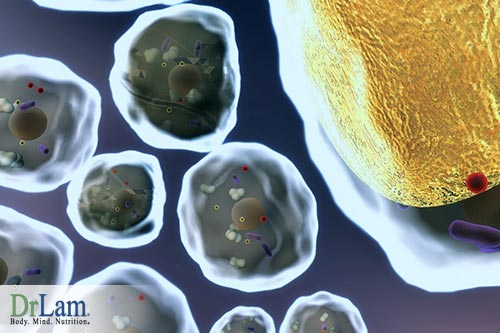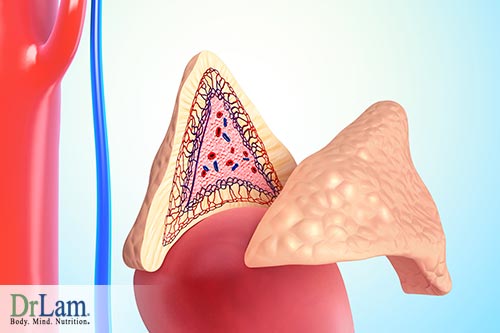“That which does not kill us makes us stronger” - Author Unknown
 We have heard many times that stress is the silent killer and it’s true. It is indeed the number one killer of women, affects people of all ages, and causes serious health ailments. However, the term “stress” is a fairly broad term, and although it can be concluded that most stress causes serious damage to our health, a new study published by Nature Communications has released scientific findings indicating that short term stress is actually good for you and increases longevity!
We have heard many times that stress is the silent killer and it’s true. It is indeed the number one killer of women, affects people of all ages, and causes serious health ailments. However, the term “stress” is a fairly broad term, and although it can be concluded that most stress causes serious damage to our health, a new study published by Nature Communications has released scientific findings indicating that short term stress is actually good for you and increases longevity!
The key word here is “short term” and should be taken extremely serious, as stress is not something to be taken lightly. When we say “short term stress” we are referring to anything from going on a jog, doing hot yoga, or spending time in a sauna. It places stresses on the body not causing too much mental anguish, but more a small amount of physical anguish.
Researchers have known for quite some time that small bouts of stress empower simple organisms and cells within the human body proactively, but a new test conducted on worms by the scientists at the Sanford Burnham Prebys Medical Discovery Institute has made this theory evident and conclusive. They have discovered a cell-recycling system that is tied to the positive effects of short term stress indicating benefits for health and longevity.
Why worms? For one, roundworms were used because they are translucent so the scientists can see exactly what is occurring inside their bodies. In addition, the majority of the molecular signaling pathways and genes in the roundworm are similar to those in human beings. Also, the worms have a lifespan of only a few weeks, so it is easy to gauge their biological age.
For the testing, researchers exposed the worms to 36 degree Celsius heat for 60 minutes. After this exposure to a short and mild form of stress, the rate of autophagy heightened across the worm’s tissues. In the next phase, a couple of days later the same worms, as well as unstressed worms, were then incubated to a longer source of heat.
Research showed that the worms that had been incubated with the heat stress obtained benefit from the shock, whereas the autophagy-deficient untreated worms, had none.
Thus, researchers were able to link the cellular process that is important for longevity, known as autophagy, to obtaining benefits from short term stress.
 What is autophagy? Derived from the Greek word “auto” meaning self, and “phagy” meaning to eat, autophagy literally translates into “self eating”. Autophagy is the body’s normal process that deals with the destruction of the cells in the body. It is best described as the way the body recycles the cell’s broken, aged and unused parts so that they can be reused to create new molecules, or better yet, burned to create energy for the body.
What is autophagy? Derived from the Greek word “auto” meaning self, and “phagy” meaning to eat, autophagy literally translates into “self eating”. Autophagy is the body’s normal process that deals with the destruction of the cells in the body. It is best described as the way the body recycles the cell’s broken, aged and unused parts so that they can be reused to create new molecules, or better yet, burned to create energy for the body.
It maintains normal functions by initiating protein degradation of destroyed cells, to allow for new cell formation. Autophagy is an extremely important function in the human body and enables the cells to survive stresses, both from the outside and inside environments, such as nutrient deprivation and infective organism invasions.
Researchers have now found that autophagy truly benefits the body when short term stress occurs. During stress at the cellular level, autophagy is upscaled and increases its productivity — a very good sign for the body.
Autophagy is seen in all eukaryotic systems and includes fungi, plants, slime mold, nematodes, fruit flies, insects, rodents, and humans.
 From the testing, researchers have concluded that a mild source of heat shock heightened the worm's ability to deal with more stressful conditions during the aging process, as well as the accumulation of damaged and aggregated proteins, which can be quite stressful for cells.
From the testing, researchers have concluded that a mild source of heat shock heightened the worm's ability to deal with more stressful conditions during the aging process, as well as the accumulation of damaged and aggregated proteins, which can be quite stressful for cells.
In the next test, the set of worms that were tested were gathered in replication to simulate a disease called Huntington’s that causes degeneration of the brain in humans. Worms were chosen with sticky neuronal proteins such as those found in diseased patients. Upon the exposure, it was seen that the heat shock decreased the protein aggregates. This suggests a moderate amount of a short term stress, can indeed minimize the toxic accumulation of proteins.
This study reveals a massive breakthrough for approaches in treating and mitigating neurodegenerative diseases such as Huntington's, Alzheimer’s and Parkinson’s. For example, in Huntington’s Disease, there is a defective genetic code for the protein labeled now as “huntingtin” which leads to brain abnormalities in functioning such as involuntary movements, a decline in thinking and reasoning skills, and mood changes.
With the newly found evidence indicating autophagy really does benefit the body with stress, the study will likely lead to more research on new treatments and preventions of a variety of neurological disorders.
As indicated, stress on the body isn't all bad. In fact, depending on your tolerance levels, it can even be considered good and beneficial to your body and cells. When the body goes too long without certain stressors, it loses its ability to handle stress properly.
Of course, on the other side of the spectrum, too much stress is detrimental to the body – triggering too many stress hormones and the inability to switch out of emergency mode. The key is to handle stresses properly. Short term stress has now been proven to help us perform better and improve our functioning at a cellular level, while chronic long-term stress could kill us.
There are different types of stress: acute stress, episodic acute stress, and chronic stress.
This includes the short term stress spoken about in the relevant study above. It is the most common form and comes from the recent and anticipated demands and pressures surrounding a person. Examples include the anticipation before skiing, the moment before the dancer enters the stage, etc. It is short term and usually does not have enough time to do that much damage, but too much acute stress can lead to Episodic Acute Stress.
 This is acute stress that occurs very frequently and perpetually overtakes someone’s life. It becomes unmanageable and overwhelming, causing physical and emotional distress.
This is acute stress that occurs very frequently and perpetually overtakes someone’s life. It becomes unmanageable and overwhelming, causing physical and emotional distress.
This is the stress that wears people down minute by minute, day after day, year after year. This type of stress on bodies and minds wreaks havoc on lives. It comes from the stress of finances, dysfunctional families, unhappy marriages, or despised jobs. Chronic stress kills and involves suicide, heart attacks, strokes, and even many types of cancers.
People need to learn to balance and manage the stress in their lives. They need to fully understand the various types of stress, be able to properly identify them, and be cautious of engaging in any stressful activities that they feel could cause more damage than good.
As we’ve learned, what stress does to our bodies is complicated and can be both good and bad depending on the situation. One of the ways our body responds to stress is by secreting two hormones: epinephrine — what is more commonly known as adrenaline — and cortisol.
Although beneficial for our “fight and flight” response system, when chronic stress is present, the abnormal release of these hormones in excess plays a negative role in the body in many ways affecting the immune system, the cardiovascular system, and the NeuroEndoMetabolic System (NEM), as well as causing adrenal gland disorders.
 The cortisol produced from the adrenal glands, along with the insulin from the pancreas, work together to provide adequate sugar to the body’s cells for energy. When stress injures these functions, the body does not work properly in managing stress and causes a plethora of side effects that follow.
The cortisol produced from the adrenal glands, along with the insulin from the pancreas, work together to provide adequate sugar to the body’s cells for energy. When stress injures these functions, the body does not work properly in managing stress and causes a plethora of side effects that follow.
Not much emphasis or acknowledgment is ever given to our adrenal glands, but proper adrenal function is essential for life and our well-being. Being able to handle stress is a key to our survival, and the control center in the bodies for that function is the adrenal glands.
During such prolonged periods of stress, our internal self-care methods such as the adrenal glands and the neuroendocrine system, diminish without us truly realizing it. We suffer adrenal exhaustion as well as other serious conditions such as heart disease, diabetes and chronic pain, anxiety, depression and other psychological disorders.
Feeling fatigued? Along with difficulty concentrating, insomnia, inability to lose weight, feeling anxious, allergies, or brain fog? Yes, they could all be stress related.
There is good news. Stress-induced damage can be reversed if caught early on, and with the newly found research that’s come out on autophagy and its benefits to health and longevity, there is even more light at the end of the tunnel. Although it may take weeks, months, or even years for healing, with proper care it can be done, and the body can restore itself to optimal health.
Some people are what's known as “photosensitive”. Watching television or working at the computer prevents melatonin levels from rising to induce a sleep state. For those people who suffer from this, It is suggested to turn off your television or computer by 8 p.m.
A lack of nutrients can cause many serious problems in general. During recovery, make sure the body receives good sources of vitamins and minerals. The right combination of delivery systems is crucial. These include liposomal, powdered, and encapsulated methods. May it be known, however, that nutrients must be dosed properly or they could be toxic. Never use a shotgun approach as it seldom works and can, in fact, backfire and cause accidental overdoses.
Skipping breakfast is not a good idea as it adds more stress onto the body. Skip starches such as bread, potatoes and french fries, and avoid sugars of all sorts, even sweet fruits.
Some medications may make recovery hard or symptoms even worse.
In conclusion, short term stress is beneficial and actually empowers the healthy body, but long-term stress is detrimental to all living things. It is important that you know the differences, become aware of how stress affects your body, and which types of stress you should willingly invite and which ones to avoid.
Before partaking in any programs deemed good for “short term stress” such as hot yoga, saunas, and jogging, be sure to check with your physician as there are many circumstances where extreme heat and stressors of this type may cause harm or death to an individual.
If your adrenals and body have been under chronic stress, short term stressors may actually have an opposite intended effect and can throw your body into a “crash and survival” mode, making matters worse. Proceed with care if you are already experiencing adrenal fatigue symptoms.
Caution should always be exerted when stressing the body in any way, and proper care should be taken to prevent injuries. For some, a simple walk will put just as much of a short term stress on the body as a long run would for others, yet will allow for a more maintainable and safer environment for inducing a beneficial stressor.
Short term stress is anything ranging from going for a job, doing hot yoga, or taking a trip to the sauna. It is more of a physical stress on the body than a neurological one. Both cause similar reactions, but the good stress is short term and is tied to good benefits mentally and physically.
